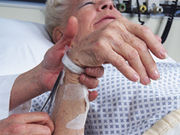Doctors, caregivers must be able to better recognize when death is imminent and unavoidable
TUESDAY, June 28, 2016 (HealthDay News) — Patients dying in old age often receive unnecessary end-of-life medical treatments in hospitals, according to research published online June 27 in the International Journal for Quality in Health Care.
The new research involved a large analysis of 38 studies done in 10 countries during the past 20 years. The review included 1.2 million doctors, patients, and their relatives.
The researchers found that one-third of patients with advanced, irreversible chronic conditions were given treatments that didn’t necessarily benefit them — including admission to intensive care unit or chemotherapy — in the last two weeks of their life. The study also revealed that one-quarter of older patients who had “do not resuscitate” orders were still given cardiopulmonary resuscitation.
As the population of older and frail patients grows, doctors and caregivers must be able to better recognize when death is imminent and unavoidable, the researchers suggested. “We have identified measurable indicators and strategies to minimize this type of intervention,” study leader Magnolia Cardona-Morrell, Ph.D., M.P.H., of the University of New South Wales’ Simpson Centre for Health Services Research in Sydney, said in a university news release. “We hope hospitals can monitor these indicators during their quality improvement activities.”
Full Text
Copyright © 2016 HealthDay. All rights reserved.








